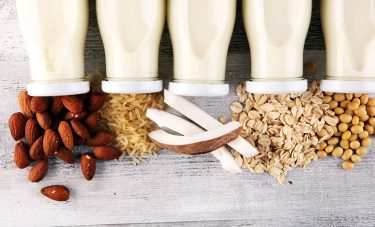Britain’s plant-based voice
- Like
- Digg
- Del
- Tumblr
- VKontakte
- Buffer
- Love This
- Odnoklassniki
- Meneame
- Blogger
- Amazon
- Yahoo Mail
- Gmail
- AOL
- Newsvine
- HackerNews
- Evernote
- MySpace
- Mail.ru
- Viadeo
- Line
- Comments
- Yummly
- SMS
- Viber
- Telegram
- Subscribe
- Skype
- Facebook Messenger
- Kakao
- LiveJournal
- Yammer
- Edgar
- Fintel
- Mix
- Instapaper
- Copy Link
Posted: 4 March 2022 | Marisa Heath | No comments yet
Marisa Heath gives an overview of the Plant-based Food Alliance UK’s goals – a new coalition of organisations from Britain’s plant-based food and drink sector.


The Plant-based Food Alliance UK was created to act as a voice for Britain’s growing plant-based food and drink sector. As a newly launched organisation, founded by Oatly, Alpro, The Vegan Society, Upfield and ProVeg UK, we are a coalition of civil society groups and businesses with the collective aim of making the UK a global leader in plant‑based food and drink.
Food systems, in terms of how we produce, process and package food, account for one‑third of greenhouse gas emissions globally. It is therefore vital to implement plans for making our food choices more sustainable. We are certain that plant-based foods will be a hugely impactful way of helping to achieve this and will play an important role in achieving the Government’s Net Zero target by 2050.
We are seeing people introduce more plant-based meals into their diets, with a quarter of the UK population now identifying as ‘flexitarian’ for reasons including health and nutrition, sustainability and biodiversity.1 In the UK, we have some of the highest purchase and consumption rates of plant-based grocery products across Europe.2 This is primarily through meat replacements and plant ‘milks’, but sales of plant-based ‘cheeses’, snacks and chocolates are also increasing. The evidence demonstrates that people are willing to change their eating habits and embrace plant-based products more than ever before.
Plant-based foods and diets can also improve the nation’s health as the World Health Organization (WHO) notes that eating a nutritious diet based on a variety of foods originating mainly from plants rather than animals can be a beneficial step towards a healthier lifestyle.3 Over the past few years, there has been an emergence and increasing popularity of some plant-based meat substitutes.
The National Food Strategy review highlights that more than three-quarters of manufactured food products sold in the UK are deemed unhealthy based on qualitative nutrient profiling systems. This industry growth presents further opportunities to create jobs through farming to produce protein crops, as well as the development of manufacturing alternative protein products in the UK. There is evidence to suggest that plant‑based foods require less land, water and resource than animal-based foods, meaning this area will be a key focus in our campaigning efforts.
With respect to meat substitutes specifically, a recent study has suggested that plant-based foods may not elicit the same health risks as the meat-based foods they are designed to mimic, with like-for-like replacement leading to a reduction in key disease risk factors, namely lower levels of a key biomarker linked to cardiovascular disease (trimethylamine N-oxide), blood cholesterol and weight gain.
We know we have an exciting opportunity to support this people-powered transition to a more sustainable, healthier food system, while simultaneously attracting more innovation and investment in the UK. The shift towards plant-based foods will ensure our national food security for future generations, help tackle our national health crisis, improve the national economy, and address the climate crisis.


Plant-based ‘milks’ are on the rise but other categories are becoming more popular in the UK including plant-based ‘cheeses’
Despite the extraordinary growth in the plant-based space and increased consumer willingness to adapt their diets, there has been limited evidence of Government engaging with the plant-based industry. Even though the UK’s plant-based food and drink scene is thriving, we have a way to go to gain high profile support for the great work the sector is doing.
This was perfectly illustrated in November at COP26. The yearly climate change conference is a crucial event, where world leaders and decision makers come together to negotiate on topics relating to how to tackle the climate crisis – yet plant-based foods rarely appeared as a topic of conversation. Government and industry must work together to ensure nutritious and sustainable food reaches consumers.
By forming the Plant-based Food Alliance UK, we hope to bridge this gap and provide a strong and unified voice for the plant-based sector, working to ensure that the UK remains a global leader in this field.
To help achieve this, the alliance will be developing a ‘UK Plant-based Food Charter’ to outline how business and Government can work collaboratively to support the uptake in plant-based diets. We have several policy ideas and strategies that we hope will support this. Our ambitions are stated herewith.
Our ambitions
We will be campaigning for transparent environmental labelling of food and drink products, so consumers can easily understand the benefits of plant-based compared to animal-based options. We are aware of several Government consultations in the coming years that deal with on-pack food labelling. The alliance will focus on environment and health labelling, drawing on the experience of our current and future members (Oatly, for example, has been championing eco-labels since 2019, and Alpro and Upfield are global leaders in plant-based nutrition).
There has been limited evidence of Government engaging with the plant-based industry.
The alliance aims to support farmers transitioning to growing crops instead of rearing animals, and assist them with meeting the growing demand for plant-based foods. An increase in production of plant-based food and drinks will help to improve our public health and our national food security, while also reducing our carbon emissions to help meet the UK’s Net Zero target. Plant-based food and drink offers opportunities to every part of the UK food supply chain, including consumers, farmers, producers, retailers and exporters. It is important for us to all work together in order to maximise the potential here.
Public health campaigns are another aspect we will be exploring to explain the health and environmental benefits of plant-based meals. One of our key aims will be to embed plant‑based diets in the Government’s anti‑obesity and prevention strategies. We want to ensure the nutritional benefits are made clear, so that people can opt for healthier choices and ultimately introduce more plant-based food and drink into their diets.
The alliance recognises the complexity relating to food production domestically and internationally and is keen to work collaboratively with the wider food sector to get the right outcomes for the public, farmers, the environment and the industry. The time to act has never been more urgent and the scale of change in recent years – in both public perceptions and industry innovation – shows there are many reasons to be optimistic that the Plant-based Food Alliance UK will drive positive change.
About the author
Marisa Heath is the Chief Executive of the Plant-based Food Alliance UK and has 15 years of experience as a policy adviser and campaigner, working to help create a more sustainable and ethical food system. Marisa has run campaigns on behalf of several sector groups, relating to food production, food waste, nutrition, climate change, biodiversity and animal welfare standards. A local councillor, she serves as Cabinet Member for Environment in Surrey County Council where she has led the Climate Change Delivery Plan.
References
- Dietery choices of Brits (e.g. vegeterian, flexitarian, meat-eater etc)? [Internet]. Yougov.co.uk. 2022 [cited 19 January 2022]. Available from: https://yougov.co.uk/topics/food/trackers/dietery-choices-of-brits-eg-vegeterian-flexitarian-meat-eater-etc
- ProVeg Consumer Survey Report Download [Internet]. ProVeg International. 2022 [cited 19 January 2022]. Available from: https://proveg.com/what-we-do/corporate-engagement/proveg-consumer-survey-report-download/
- A healthy lifestyle [Internet]. Euro.who.int. 2022 [cited 19 January 2022]. Available from: https://www.euro.who.int/en/health-topics/disease-prevention/nutrition/a-healthy-lifestyle
You may also like:
- Podcast: What’s more sustainable – a meat-based diet or a vegan one?
- VODCAST Episode Eighteen (special on plant-based #2): Female leaders discuss alternative proteins
- Episode Sixteen (special on plant-based #1): Inspiring insights from women leaders in the plant-based industry
- Majority of Brits won’t take plant-based plunge
- Plant-based power: restaurants embrace Veganuary
Issue
Related topics
Food Security, Free From, Ingredients, Natural, Plant based, Proteins & alternative proteins
Related organisations
Alpro, Oatly UK, ProVeg UK, The Vegan Society, Upfield, World Health Organization (WHO)









